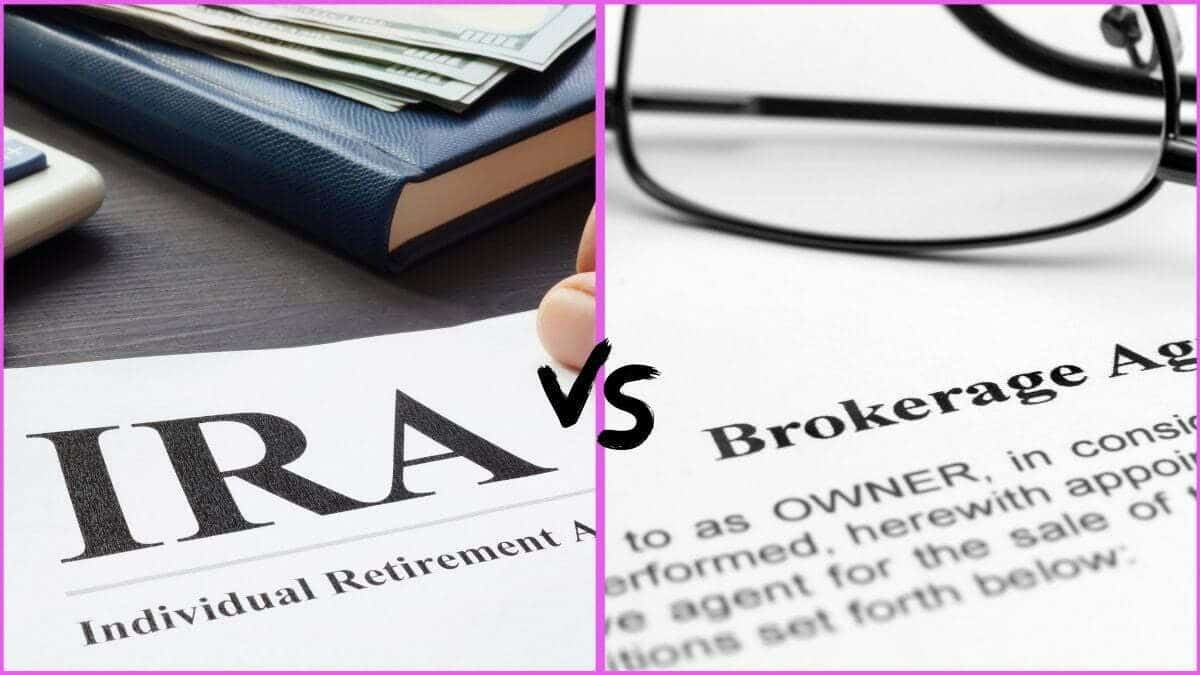Brokerage accounts vs IRA which one is better? A brokerage account is a taxed account that allows you to buy and sell various sorts of investments with no contribution limits and no penalties for selling your investments. An IRA, on the other hand, is not the same as a brokerage account. It’s utilized for tax-free investing, but there are stringent contribution limits and withdrawals may incur a taxable fee.
These are some of the most important things to remember in brokerage accounts vs IRA.
Accounts with a brokerage firm are taxed. You can use this account to buy and sell stocks and other forms of assets.
Individual Retirement Accounts (IRAs) are designed for persons who desire to save for their early retirement. They allow you to grow your investments tax-free, and this growth might happen over time. IRAs, on the other hand, have stringent contribution limits and may be subject to a taxed fee if withdrawals are made.
.
Brokerage accounts Vs IRA
Bonds, mutual funds, stocks, REITs, and other securities are all available to purchase and sell on both platforms.
IRAs, on the other hand, provide a tax-free alternative for people to save for retirement.
Intraday trading, long-term investing, and short-term savings are all done through brokerage accounts. They can also utilise them to save for short-term financial goals such as the purchase of real estate or automobiles.
Some people think that having both types of accounts might be a positive thing for their money. It’s a good idea to use both the brokerage account’s flexibility and the IRA’s tax benefits at the same time.
An individual retirement account(IRA)
For people who want to save for their future, an IRA is a tax-friendly investment account. You can’t hold naked options in a brokerage account, but if you have a Roth or traditional IRA, your money grows tax-exempt, depending on which one you have.
IRAs have strict contribution limits, unlike brokerage accounts, which have a lot more room for money to go in.
You can open an IRA with a bank or a brokerage. You should keep in mind that an IRA isn’t an investment in itself. It’s an account that holds the investments that you pick. It’s possible to invest in a lot of things, from stocks and bonds to mutual funds, real estate, ETFs, and even real estate.
Brokerage accounts
Your brokerage account is where you can purchase and sell stocks and other things. As we said, a brokerage account is a taxable account that lets you purchase and sell stocks and other assets. In the stock market, there are no bounds on how much money you can invest, and you don’t have to pay a fee if you want to sell your investments right away.
As far as taxes go, you’ll pay them on dividends, interest, and capital gains in the tax year that you make them, so you’ll have to pay them when you do. There are a lot of brokerage firms, and which one is best for you depends on how you invest, what kind of investments you like, and what kind of trading platform you want. As soon as you choose a brokerage firm, you can open and fund an account online, and it usually only takes a few minutes to do.
Brokerage Accounts and IRAs Taxable System
Choosing profitable investments is an important part of investing and making money. Nobody would say that this is not important. Still, investing in a tax-friendly way is important because it lets you keep as much of your money as you can. You might not have to pay taxes on the money you make from dividends, interest, and capital gains, depending on what kind of account you have. This is because brokerage accounts and IRAs are very different.
There are taxes that are paid on a brokerage account.
Investing in brokerage accounts is taxed. if you make money because your investments pay you interest or dividends, or if your investments grow in value, you’ll have to pay tax on that money. If you make money through a job or a business, you may have to pay taxes.
Interests
From investments like bonds, certificates of deposit (CDs), or any cash you have in the account that isn’t invested, you might get a small amount of money back. U.S. Treasuries aren’t subject to state or local income taxes, and municipal bonds are usually exempt from federal taxes. Interest income is usually taxed the same way as other types of income (and sometimes state and local taxes, too).
Dividends
If a company makes money, dividends are what you get to share. There are two types of dividends. Each one is taxed in a unique way.
- When public companies pay shareholders dividends, most of them are called qualified dividends. These dividends are taxed at the lower long-term rate of capital gains.
- People who own REITs, master limited partnerships, and business development companies (BDCs) usually get dividends that aren’t taxed at a lower rate than people who own other types of businesses.
Capital Gain
If you make money when you sell an investment, you will have to pay taxes on that money. How much tax you pay depends on how long you owned the investment. Short-term capital gains are taxed as ordinary income if you make money from investments you haven’t held for more than a year, like stocks or bonds. Long-term capital gains, on the other hand, are taxed at a lower rate than short-term capital gains.
An IRA account tax
Contributions to a traditional IRA are made with money that hasn’t been taxed yet. If you or your spouse are covered by a retirement plan at work, you may be able to write off some of the money you put in.
This means that when you contribute to your Roth IRA with money that has already been taxed, it doesn’t get taxed when you do it that year. Instead, the tax benefit comes when you retire, when your withdrawals aren’t taxed at all, so it’s better for you.
Income from IRAs is tax-free or tax-deferred, depending on the type of IRA you have.
A Roth IRA.
It doesn’t give you a tax break at the start, so contributions don’t lower your taxable income. But qualified withdrawals in retirement are tax-free, and you can take your contributions out at any time, for any reason, without being hit with a charge. It’s also different from traditional IRAs in that Roth IRAs don’t have to pay out a certain amount of money each year.
The traditional IRA
Traditional IRAs can help you lower your taxable income. But withdrawals are taxed, and early withdrawals are usually punished by 10%. You can avoid the penalty (but not the tax) if you use the money to pay for qualified expenses for first-time homebuyers.
To open a brokerage account, is there a minimum amount that you must pay?
Is it going to depend on which brokerage firm you work with? There are many brokers today that don’t require any money at all to start buying investments. Of course, you’ll need to deposit at least $2,000 if you want to be able to trade on the margin.
Bottom Line(Brokerage accounts vs IRA)
Financial advisers say it’s best to have both accounts. A brokerage account can be used for intraday trading, long-term investing, and saving for short-term financial goals. An IRA is for saving for retirement.
Also Read
Trade With the Flow, Not With Opinions


